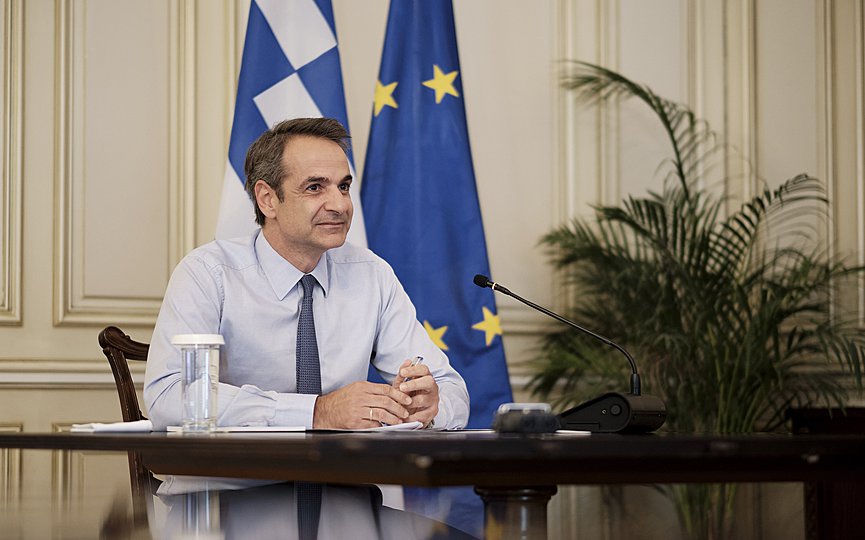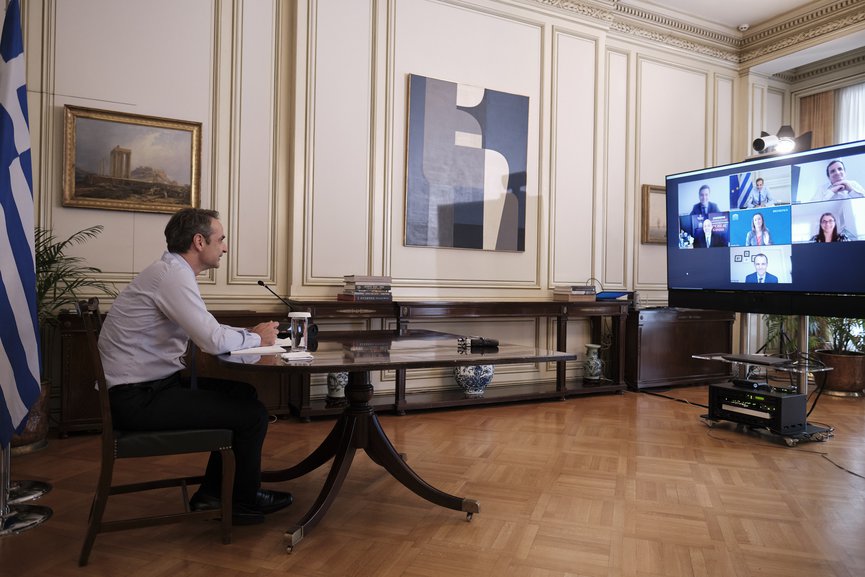General News
Meropi Kyriacou Honored as TNH Educator of the Year
NEW YORK – Meropi Kyriacou, the new Principal of The Cathedral School in Manhattan, was honored as The National Herald’s Educator of the Year.

WASHINGTON, DC – On May 27 the Brookings Foreign Policy program, in partnership with the University of Virginia Miller Center, presented a webinar featuring Prime Minister Kyriakos Mitsotakis discussing Greece’s successful management of the COVID-19 crisis and the challenges and opportunities lying ahead.
Following welcome remarks by Brookings Institution President John Allen and UVA President James Ryan, Brookings Senior Fellow Amanda Sloat, and UVA Miller Center Director and CEO William Antholis moderated a conversation with Mitsotakis that included questions from the audience. The National Hellenic Society also supported the event.
Ryan began by attributing some of Greece’s success “to the fact that the Prime Minister acted quickly, following the advice of public health experts” who “communicated with the Greek people regularly and clearly.” Allen noted Mitsotakis’ “swift and bold action at the outset of this terrible health crisis,” and added that his “strong leadership have come to be deeply admired across the U.S. and around the world,” where officials now “turn to Greece for best practices and inspiration.”
Mitsotakis made four points summarizing Greece’s COVID-19 actions: 1) Deciding to act early rather than late once it was grasped that a lockdown was inevitable; 2) “communicating very clearly and trying to build trust among the Greek population; 3) Quickly strengthening “our National Health service.”
He said, “we doubled the number of ICU units…[got] enough personal protective equipment to cover all our healthcare needs,” and emphasized “we did not lose a single healthcare professional…and they did a fantastic job.”
Last but not least, “we protected our more vulnerable…and our elderly population. We didn’t have a single fatality in publicly run facilities for the elderly.”
He emphasized, however, that “reopening…is more complicated than closing down the economy,” adding they are fighting complacency through reminders about continuing social distancing and “monitoring new cases very carefully, adding regarding Greece’s vital tourism sector, “I expect to be able to welcome tourists again as of July 1.”
Addressing Sloat’s question about COVID’s economic fallout, Mitsotakis said the government already passed – in a fiscally responsible manner – a 24-billion-euro package of fiscal measures and guarantees to help companies with their liquidity. “We moved quickly to protect jobs and the income of those whose employment was temporarily suspended.”
The EU is helping, he said. Mitsotakis is pleased the ECB has for the first time accepted Greek bonds for its asset purchase program and is a happy with the announcement of the EU’s historic 750-billion-euro Recovery Fund, with 500 billion in direct grants to countries that have suffered the most.” He said that if these are successfully implemented “this will be a huge step for the EU to actually demonstrate solidarity in a tangible manner…it’s an opportunity to do something really bold that re-invigorates the European project.”
WHEN CAN AMERICANS GO TO GREECE?
It is also in a responsible manner that Greece is opening up to tourism with selective countries.
Regarding Antholis’ question about tourists from the U.S. Mitsotakis said candidly they are “still looking at data from all countries…but it is unlikely [the U.S.] will be on the July 1list,” – other officials note August is a reasonable target.

“Come September,” he said, the challenge “will be to put Greece back on a growth track. Our main agenda item – to make Greece an attractive destination for foreign investment – is as valid today as it was six months ago.” He said under his new government, Greece was going out of its way to attract investment and that they were doing “extremely well before COVID-19.”
Greece this year also successfully faced a challenge on its borders. Mitsotakis stressed that it was “a systematic attempt by Turkey to encourage desperate people to cross the border…Turkey blackmailed Europe.” But he still believes the EU and Ankara can come up with a win-win solution to the migration crisis, and that Greece “can have an open and constructive dialogue with Turkey…and ease the tension.”
On another optimistic note, Sloat said there are signs the increasing digitalization of the world after COVID-19 is reversing Greece’s brain drain. “I would certainly hope it is a longer term trend,” Mitsotakis said, given that “job creation, and high quality job creation, is our number one priority.”
NEW YORK – Meropi Kyriacou, the new Principal of The Cathedral School in Manhattan, was honored as The National Herald’s Educator of the Year.

MELBOURNE, Australia (AP) — More than 100 long-finned pilot whales that beached on the western Australian coast Thursday have returned to sea, while 29 died on the shore, officials said.
Welcome to some highlights of the history, cities, sites, and nature that await visitors to Eastern Macedonia and Thrace.
KYIV, Ukraine (AP) — Russia launched a barrage of missiles against Ukraine overnight, in attacks that appeared to target the country’s energy infrastructure.
MADRID (AP) — Top-ranked Iga Swiatek eased into the Madrid Open’s round-of-16 by beating Sorana Cirstea 6-1, 6-1 on Saturday.
NEW YORK (AP) — Donald Trump says he wants to hold a major campaign event at New York’s Madison Square Garden featuring Black hip-hop artists and athletes.